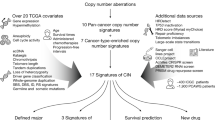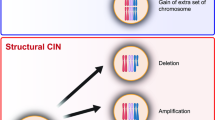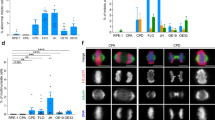Abstract
Numerous observations suggest that chromosome instability is caused by mitotic abnormalities such as errors in the partitioning of chromosomes. Chfr was recently defined as a central component of a new mitotic checkpoint that delays chromosome condensation in response to mitotic stress. Chfr was shown to be frequently inactivated in several human neoplasms, including colon, lung and esophageal cancers. To test whether Chfr inactivation may lead or participate to chromosomal instability (CIN), we analysed the genetic and epigenetic status of the gene in a large panel of primary colon and breast cancers, as well as in colon and breast cancer cell lines displaying either a microsatellite instability or a CIN. Our results confirm that Chfr is frequently inactivated in colon cancers, through a mechanism of hypermethylation of the promoter sequences. In contrast, the loss of Chfr expression appears to be a rare event in breast cancers. Furthermore, our data demonstrate that Chfr inactivation is not associated with CIN in these frequent types of human cancers.
This is a preview of subscription content, access via your institution
Access options
Subscribe to this journal
Receive 50 print issues and online access
$259.00 per year
only $5.18 per issue
Buy this article
- Purchase on Springer Link
- Instant access to full article PDF
Prices may be subject to local taxes which are calculated during checkout


Similar content being viewed by others
References
Ahuja N, Mohan AL, Li Q, Stolker JM, Herman JG, Hamilton SR, Baylin SB and Issa JP . (1997). Cancer Res., 57, 3370–3374.
Bunz F, Fauth C, Speicher MR, Dutriaux A, Sedivy JM, Kinzler KW, Vogelstein B and Lengauer C . (2002). Cancer Res., 62, 1129–1133.
Cahill DP, Lengauer C, Yu J, Riggins GJ, Willson JK, Markowitz SD, Kinzler KW and Vogelstein B . (1998). Nature, 392, 300–303.
Corn PG, Summers MK, Fogt F, Virmani AK, Gazdar AF, Halazonetis TD and El-Deiry WS . (2003). Carcinogenesis, 24, 47–51.
Doxsey S . (2002). Mol. Cell, 10, 439–440.
Duval A and Hamelin R . (2002). Ann. Genet., 45, 71–75.
Forozan F, Mahlamaki EH, Monni O, Chen Y, Veldman R, Jiang Y, Gooden GC, Ethier SP, Kallioniemi A and Kallioniemi OP . (2000). Cancer Res., 60, 4519–4525.
Gayet J, Zhou XP, Duval A, Rolland S, Hoang JM, Cottu P and Hamelin R . (2001). Oncogene, 20, 5025–5032.
Ghadimi BM, Sackett DL, Difilippantonio MJ, Schrock E, Neumann T, Jauho A, Auer G and Ried T . (2000). Genes Chromosomes Cancer, 27, 183–190.
Gioanni J, Le Francois D, Zanghellini E, Mazeau C, Ettore F, Lambert JC, Schneider M and Dutrillaux B . (1990). Br. J. Cancer, 62, 8–13.
Imai Y, Shiratori Y, Kato N, Inoue T and Omata M . (1999). Jpn. J. Cancer Res., 90, 837–840.
Jackson AL and Loeb LA . (1998). Semin. Cancer Biol., 8, 421–429.
Kallioniemi A, Kallioniemi OP, Piper J, Tanner M, Stokke T, Chen L, Smith HS, Pinkel D, Gray JW and Waldman FM . (1994). Proc. Natl. Acad. Sci. USA, 91, 2156–2160.
Kang D, Chen J, Wong J and Fang G . (2002). J. Cell Biol., 156, 249–259.
Kytola S, Rummukainen J, Nordgren A, Karhu R, Farnebo F, Isola J and Larsson C . (2000). Genes Chromosomes Cancer, 28, 308–317.
Lengauer C, Kinzler KW and Vogelstein B . (1998). Nature, 396, 643–649.
Lingle WL, Barrett SL, Negron VC, D'Assoro AB, Boeneman K, Liu W, Whitehead CM, Reynolds C and Salisbury JL . (2002). Proc. Natl. Acad. Sci. USA, 99, 1978–1983.
Loeb LA and Christians FC . (1996). Mutat. Res., 350, 279–286.
Luker KE, Pica CM, Schreiber RD and Piwnica-Worms D . (2001). Overexpression of IRF9 confers resistance to antimicrotubule agents in breast cancer cells. Cancer Res., 61, 6540–6547.
Mizuno K, Osada H, Konishi H, Tatematsu Y, Yatabe Y, Mitsudomi T, Fujii Y and Takahashi T . (2002). Oncogene, 21, 2328–2333.
Paulovich AG, Toczyski DP and Hartwell LH . (1997). Cell, 88, 315–321.
Rummukainen J, Kytola S, Karhu R, Farnebo F, Larsson C and Isola JJ . (2001). Cancer Genet. Cytogenet., 126, 1–7.
Sato M, Sekido Y, Horio Y, Takahashi M, Saito H, Minna JD, Shimokata K and Hasegawa Y . (2000). Jpn. J. Cancer Res., 91, 504–509.
Scolnick DM and Halazonetis TD . (2000). Nature, 406, 430–435.
Sen S . (2000). Curr. Opin. Oncol., 12, 82–88.
Sen S, Zhou H and White RA . (1997). Oncogene, 14, 2195–2200.
Shibata Y, Haruki N, Kuwabara Y, Ishiguro H, Shinoda N, Sato A, Kimura M, Koyama H, Toyama T, Nishiwaki T, Kudo J, Terashita Y, Konishi S, Sugiura H and Fujii Y . (2002). Carcinogenesis, 23, 1695–1699.
Toyota M, Ahuja N, Ohe-Toyota M, Herman JG, Baylin SB and Issa JP . (1999). Proc. Natl. Acad. Sci. USA, 96, 8681–8686.
Tsushimi T, Noshima S, Oga A, Esato K and Sasaki K . (2001). Cancer Genet. Cytogenet., 126, 34–38.
Wang Q, Moyret-Lalle C, Couzon F, Surbiguet-Clippe C, Saurin JC, Lorca T, Navarro C and Puisieux A . (2003). Oncogene, 22, 1486–1490.
Wheeler JM, Beck NE, Kim HC, Tomlinson IP, Mortensen NJ and Bodmer WF . (1999). Proc. Natl. Acad. Sci. USA, 96, 10296–10301.
Zhou H, Kuang J, Zhong L, Kuo WL, Gray JW, Sahin A, Brinkley BR and Sen S . (1998). Nat. Genet., 20, 189–193.
Acknowledgements
We thank T Halazonetis for Chfr constructs. This work was supported by grants from the Comité Départemental du Rhône and the Comité Départemental de l'Ain de la Ligue de Lutte contre le Cancer, and from the Association pour la Recherche sur le Cancer.
Author information
Authors and Affiliations
Corresponding author
Rights and permissions
About this article
Cite this article
Bertholon, J., Wang, Q., Falette, N. et al. Chfr inactivation is not associated to chromosomal instability in colon cancers. Oncogene 22, 8956–8960 (2003). https://doi.org/10.1038/sj.onc.1207078
Received:
Revised:
Accepted:
Published:
Issue Date:
DOI: https://doi.org/10.1038/sj.onc.1207078
Keywords
This article is cited by
-
Epigenetic insights in the diagnosis, prognosis, and treatment selection in CRC, an updated review
Molecular Biology Reports (2022)
-
Emerging evidence for CHFR as a cancer biomarker: from tumor biology to precision medicine
Cancer and Metastasis Reviews (2013)
-
CHFR: a key checkpoint component implicated in a wide range of cancers
Cellular and Molecular Life Sciences (2012)
-
Chfr and RNF8 synergistically regulate ATM activation
Nature Structural & Molecular Biology (2011)
-
SIRT2, a tubulin deacetylase, acts to block the entry to chromosome condensation in response to mitotic stress
Oncogene (2007)



